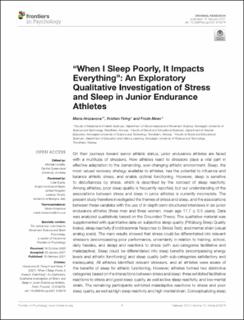| dc.description.abstract | On their journeys toward senior athletic status, junior endurance athletes are faced with a multitude of stressors. How athletes react to stressors plays a vital part in effective adaptation to the demanding, ever-changing athletic environment. Sleep, the most valued recovery strategy available to athletes, has the potential to influence and balance athletic stress, and enable optimal functioning. However, sleep is sensitive to disturbances by stress, which is described by the concept of sleep reactivity. Among athletes, poor sleep quality is frequently reported, but our understanding of the associations between stress and sleep in junior athletes is currently incomplete. The present study therefore investigated the themes of stress and sleep, and the associations between these variables with the use of in-depth semi-structured interviews in six junior endurance athletes (three men and three women, mean age 17.7 ± 0.5 years). Data was analyzed qualitatively based on the Grounded Theory. The qualitative material was supplemented with quantitative data on subjective sleep quality (Pittsburg Sleep Quality Index), sleep reactivity (Ford Insomnia Response to Stress Test), and mental strain (visual analog scale). The main results showed that stress could be differentiated into relevant stressors (encompassing poor performance, uncertainty in relation to training, school, daily hassles, and sleep) and reactions to stress (with sub-categories facilitative and maladaptive). Sleep could be differentiated into sleep benefits (encompassing energy levels and athletic functioning) and sleep quality (with sub-categories satisfactory and inadequate). All athletes identified relevant stressors, and all athletes were aware of the benefits of sleep for athletic functioning. However, athletes formed two distinctive categories based on the interactions between stress and sleep: three exhibited facilitative reactions to stress and good sleep quality, as well as low sleep reactivity, and low mental strain. The remaining participants exhibited maladaptive reactions to stress and poor sleep quality, as well as high sleep reactivity and high mental strain. Conceptualizing sleep quality based on the evaluation of stressors, reactions to stress, degree of mental strain, and the propensity to stress-related sleep disturbance may offer a plausible explanation for why the occurrence of stressors leads to poor sleep quality in some athletes, but not others. | en_US |

